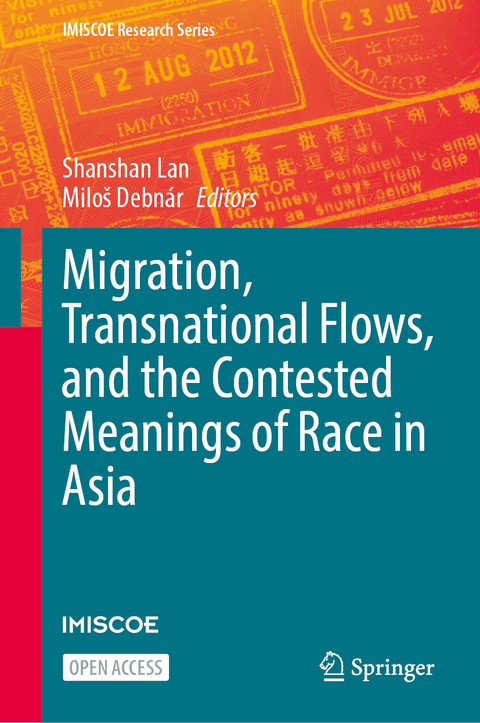
Migration, Transnational Flows, and the Contested Meanings of Race in Asia
Springer International Publishing (Verlag)
978-3-031-81544-7 (ISBN)
- Noch nicht erschienen - erscheint am 09.03.2025
- Versandkostenfrei innerhalb Deutschlands
- Auch auf Rechnung
- Verfügbarkeit in der Filiale vor Ort prüfen
- Artikel merken
This open access edited volume addresses the multi-layered relations between migration, transnational flows, and the contested meanings of race in Asia. It tries to answer the following questions: how do migration and transnational flows from the Western world impact racial knowledge formation in Asian societies? To what extent do they challenge, perpetuate, and reshape unequal power relations based on the intersection of race, gender, class, nationality, citizenship, and migration status in Asia? How are dominant Western racial categories such as race, whiteness, and blackness redefined and reconstructed in the context of the Covid-19 pandemic, when transnational mobility became both heavily restricted and stigmatized ? The book is divided into three parts: Race, Language and Migration status, Covid-19 and the Dynamics of Racialization, Gender and Interracial Encounters. This book positions itself in the nexus of race, migration and pandemic research and will make a significant contribution to critical race studies, whiteness studies, globalization, multiculturalism, and social transformation in Asia. This book is aimed at students and scholars in race and migration studies in Asia and beyond. This is an open access book.
Shanshan Lan is Associate Professor in the Department of Anthropology at the University of Amsterdam, The Netherlands. Her research interests include urban anthropology, migration and mobility regimes, comparative racial formations in Asia and Euro-America, transnational student mobility, global cities, African diaspora in China, Chinese diaspora in the United States, and class and social transformations in Chinese society. Lan is the Principal Investigator of the ERC project "The reconfiguration of whiteness in China: Privileges, precariousness, and racialized performances" (CHINAWHITE, 2019-2024). She is the author of two books: Diaspora and Class Consciousness: Chinese Immigrant Workers in Multiracial Chicago (2012), and Mapping the New African Diaspora in China: Race and the Cultural Politics of Belonging (2017). She also published articles in American Anthropologist, Journal of Ethnic and Migration Studies, Anthropological Quarterly, International Migration, and other academic journals.
Milos Debnár is Associate Professor at the Faculty of International Studies, Ryukoku University in Kyoto, Japan. He received his Ph.D. in sociology from Kyoto University in 2014 and his main research interest is sociology of European migration to Japan. He has written on migration patterns, social integration and the role of race and whiteness in the integration. His current projects are a comparative study analysing choices of staying and leaving by European migrants to Japan, and a collaborative project with the University of Vienna on study abroad in East Asia by students at Central European universities. He is the author of Migration, Whiteness, and Cosmopolitanism: Europeans in Japan(2016) and his recent publications include a paper co-authored with Spela Drnovsek Zorko Comparing the racialization of Central-East European migrants in Japan and the UK (CMS, 2021, 9:30) and a chapter Privileged, Highly Skilled and Unproblematic? White Europeans in Japan as Migrants published in Expatriation and Migration: Two Faces of the Same Coin (ed. Sylvain Beck, 2023).
Chapter 1 Introduction: Researching race and migration in a transnational context.- Part I: Race, Language, and Representations.- Chapter 2. The Whiteness of English: Raciolinguistic Chronotopes and Cultural Transformations in Contemporary China.- Chapter 3. "Because I am a Foreigner": Western Migrants' Navigations of the Chinese State.- Part II: COVID - 19, Geopolitics and shifting Ethno-Racial Ideologies.- Chapter 4. "Now we are no longer needed!": How White European Migrants Talk about Race and Covid-19 in China.- Chapter 5. "EuroAmerican teachers are our hardware:" Shifting Racial Hierarchies in Chinese Private English Schools after 2020.- Chapter 6. Locating the Complexity of Whiteness in the Migration Context of Japan - white Europeans as 'good migrants'.- Chapter 7. 'White Innovation': Conceptualizing Changing Racial Hierarchies Through Migrant Entrepreneurship in Singapore and Japan.- Part III: Gender and Interracial Encounters.-Chapter 8. Being a Black Woman in Japan: The Intersectionality of Race, Gender, and Nationality.- Chapter 9. Navigating Whiteness in ELT: Fear, Anger, and Exhaustion Among Chinese Women Teachers.- Chapter 10. Post-Soviet White Femininities and Marriage Migration in China.- Chapter 11. Opening New Horizons in Race and Migration Studies.
| Erscheint lt. Verlag | 9.3.2025 |
|---|---|
| Reihe/Serie | IMISCOE Research Series |
| Zusatzinfo | Approx. 250 p. |
| Verlagsort | Cham |
| Sprache | englisch |
| Maße | 155 x 235 mm |
| Themenwelt | Sozialwissenschaften ► Soziologie ► Spezielle Soziologien |
| Schlagworte | Black Woman in Japan • Covid-19 and the racialization of migrants • Migration and transnational flows • open access • Private English schools in China • Race and the ELT (English language Teaching) industry • Race, gender, and intersectionality • Racialization processes in Western countries and in Asia • Racial knowledge formation in Asian societies • Researching race and migration in a transnational context • The nexus of race, migration and pandemic research • The shifting perceptions of Russia-Ukraine war • Transnational circulation of racial knowledge • Ukrainian refugees in China and Japan • White racial formation in a transnational pandemic context • White supremacy and anti-black racism • White Western migrants' experiences in China • White Western migrants’ experiences in China |
| ISBN-10 | 3-031-81544-0 / 3031815440 |
| ISBN-13 | 978-3-031-81544-7 / 9783031815447 |
| Zustand | Neuware |
| Haben Sie eine Frage zum Produkt? |
aus dem Bereich


